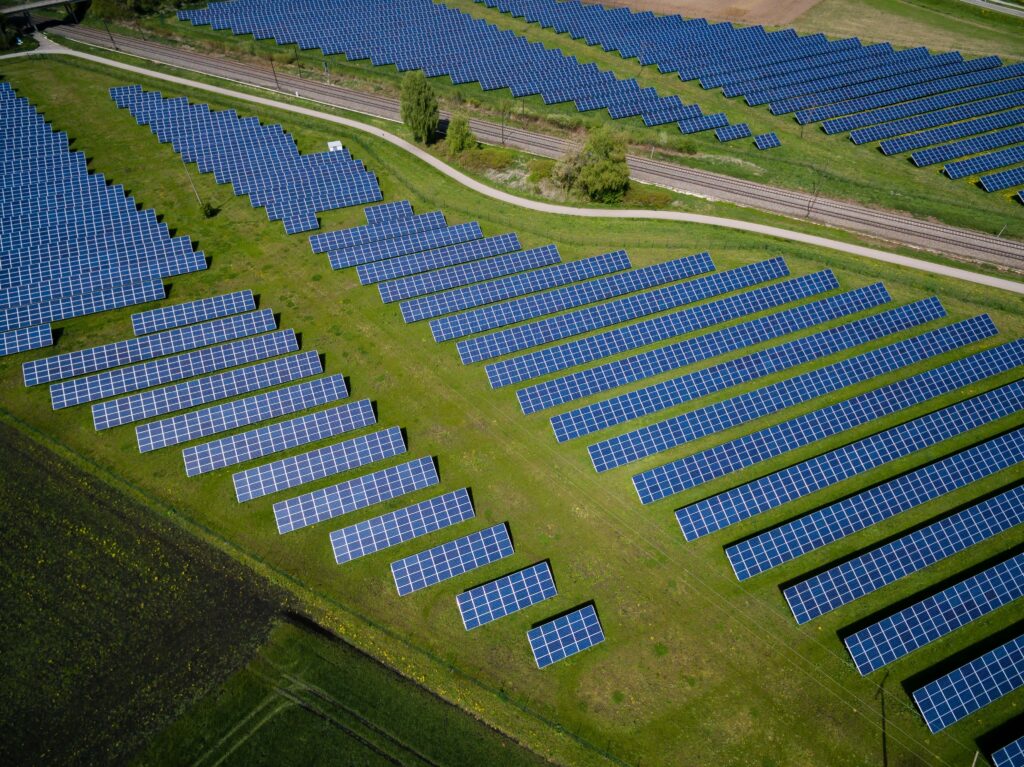Imagine having the freedom to power your life without relying on the conventional electricity grid. It sounds like a dream, doesn’t it? But before you can bid farewell to monthly bills and embrace off-grid living, there’s one crucial question you need to answer: how many batteries do you need? The answer lies in a complex web of factors, from your energy usage to the climate in your area. So, let’s take a friendly stroll through this article and uncover the secrets to making your off-grid dreams a reality.

Understanding Off-Grid Living
Definition of off-grid living
Off-grid living refers to a lifestyle where individuals or households are completely self-sufficient in terms of their energy needs. This means that they are not connected to the traditional power grid and rely on alternative sources of energy to meet their electricity requirements. It involves generating your own electricity, conserving energy, and living in a more sustainable and independent manner.
Benefits of off-grid living
There are numerous benefits associated with off-grid living. Firstly, it allows individuals to reduce their carbon footprint and contribute to a greener environment. By generating energy from renewable sources such as solar power, wind turbines, or hydroelectric systems, off-grid living significantly reduces the reliance on fossil fuels, which are harmful to the environment.
Secondly, off-grid living provides individuals with total energy independence. Unlike those connected to the power grid, off-grid dwellers are not affected by power outages or disruptions in the grid. This enhances their resilience and self-reliance, especially in remote areas and during natural disasters.
Furthermore, off-grid living promotes a simpler and more sustainable lifestyle. By reducing energy consumption and being mindful of resource usage, off-grid dwellers learn to appreciate the value of energy and strive towards a more sustainable future.
Challenges of off-grid living
Although off-grid living brings numerous benefits, it also comes with its own set of challenges. The initial setup cost can be quite high, including the investment in solar panels, wind turbines, batteries, and other equipment. It requires careful planning and budgeting to ensure a successful transition to off-grid living.
Another challenge is the limited availability of energy during adverse weather conditions. For example, during cloudy or rainy days, solar energy generation is reduced, which can affect the energy supply. An efficient backup plan or alternative energy sources are crucial to overcoming this challenge and ensuring a reliable power supply.
Additionally, off-grid living requires individuals to be mindful of their energy consumption. With limited resources, it becomes essential to conserve energy and make conscious decisions regarding energy usage. This may involve adopting energy-efficient appliances, optimizing energy usage, and continually assessing and adjusting energy needs.
Energy Consumption Analysis
Factors contributing to energy consumption
Understanding the factors contributing to energy consumption is crucial for effective off-grid living. Some of the key factors include the size of your living space, the number of occupants, climate conditions, and the energy efficiency of appliances and electronics used. Heating and cooling systems, lighting, cooking appliances, and electronics are among the main contributors to energy consumption.
How to calculate your daily energy consumption
Calculating your daily energy consumption is an important step in managing your off-grid system effectively. To calculate this, you should consider the wattage or power rating of each appliance or electronic device you use. Multiply the wattage by the number of hours you use the device per day, and sum up the energy usage from all devices to determine your daily energy consumption.
Tips to reduce energy consumption
Reducing energy consumption is crucial for sustainable off-grid living. There are several tips you can follow to achieve this:
-
Invest in energy-efficient appliances and electronics. Look for appliances with the Energy Star rating, which indicates their energy-saving capabilities.
-
Practice good energy management habits. Turn off lights and unplug electronic devices when not in use. Utilize natural lighting during the day whenever possible.
-
Optimize heating and cooling systems. Ensure proper insulation in your living space to minimize heat loss during winter and heat gain during summer. Use fans instead of air conditioning whenever feasible.
-
Consider alternative cooking methods. Use energy-efficient appliances such as slow cookers, pressure cookers, or outdoor grills to minimize energy consumption during cooking.
By adopting these tips and making conscious choices, you can significantly reduce your energy consumption and maximize the efficiency of your off-grid living.
Introduction to Solar Energy
What is solar energy
Solar energy is the radiant energy emitted by the sun, which can be harnessed and converted into electricity through the use of solar panels. It is a clean and renewable source of energy, available abundantly and free of cost.
Benefits of solar energy for off-grid living
Solar energy offers several advantages for off-grid living. Firstly, it is a sustainable and renewable energy source. As long as the sun continues to shine, solar energy will be available for use. This makes it an ideal choice for off-grid living, as it eliminates the reliance on non-renewable fossil fuels.
Secondly, solar energy is environmentally friendly. It does not produce greenhouse gas emissions or contribute to air or water pollution. By harnessing solar energy, off-grid dwellers can significantly reduce their carbon footprint and contribute to a cleaner and healthier environment.
Furthermore, solar energy provides a reliable and steady source of power. With advancements in technology, solar panels have become more efficient at converting sunlight into electricity. This reliability ensures a constant energy supply, even during periods of reduced sunlight, with the use of appropriate backup systems.
Limitations of solar energy
Despite its numerous benefits, solar energy does have a few limitations. Firstly, solar energy generation is dependent on sunlight availability. During cloudy or rainy days, the energy output from solar panels can be significantly reduced, affecting the overall energy supply.
Secondly, the initial setup cost of solar panel systems can be relatively high, though the long-term savings on electricity bills offset this cost over time. It is essential to consider the upfront investment required and the potential return on investment when transitioning to solar energy for off-grid living.
Lastly, solar panels require proper maintenance to operate at their peak efficiency. Regular cleaning, inspection, and maintenance of the panels are necessary to ensure optimal energy generation. However, the maintenance required is minimal compared to the potential benefits gained from solar energy.
Understanding Batteries for Off-Grid Living
The role of batteries in off-grid systems
Batteries play a crucial role in off-grid systems as they store excess energy generated by renewable sources, such as solar panels or wind turbines. This stored energy can be used during times of low energy production or when there is a higher demand for electricity than what the renewable sources can provide.
Types of batteries used in off-grid systems
Several types of batteries are commonly used in off-grid systems, including lead-acid batteries, lithium-ion batteries, and flow batteries. Lead-acid batteries are the most common and cost-effective option, while lithium-ion batteries offer higher performance and a longer lifespan.
Key features to consider when choosing a battery
When choosing a battery for your off-grid system, there are several key features to consider. These include:
-
Capacity: The capacity of the battery determines the amount of energy it can store. It is essential to choose a battery with sufficient capacity to meet your energy requirements and provide autonomy during periods of low energy production.
-
Depth of Discharge (DoD): The DoD refers to the percentage of a battery’s capacity that can be utilized before it requires recharging. It is important to choose a battery with a higher DoD to maximize usable energy.
-
Efficiency: Battery efficiency is a measure of the energy that can be retrieved from the battery compared to the energy stored. Choosing a battery with high efficiency ensures that you can utilize the maximum amount of stored energy.
Considering these features and understanding your specific energy needs will help you select the most suitable battery for your off-grid system.

How Solar Batteries Work
The science behind solar batteries
Solar batteries work by storing the excess electricity generated by solar panels during periods of high energy production. This stored energy can then be used when there is low or no energy production, such as during the night or on cloudy days. The batteries store the energy in a chemical form and convert it back into electricity when needed.
Charging and discharging of solar batteries
Solar batteries are charged when the solar panels produce more electricity than is being used in the off-grid system. This excess energy is directed towards the batteries, which store it for later use. When energy demand exceeds the production capacity, the batteries discharge and provide the required electricity to power the off-grid system.
Lifecycle of a solar battery
The lifespan of a solar battery depends on several factors, including the type of battery, the depth of discharge, the temperature it operates in, and the maintenance it receives. On average, solar batteries can last anywhere from 5 to 15 years. Regular maintenance, optimal charging and discharging practices, and proper storage conditions can help maximize the lifespan of the batteries.
Determining The Number of Batteries Needed
How to calculate the number of batteries needed
Calculating the number of batteries needed for your off-grid system requires considering your daily energy consumption and the battery capacity. Divide your daily energy consumption by the capacity of a single battery to determine the number of batteries required. It is crucial to consider the desired depth of discharge and the autonomy required to ensure a reliable energy supply.
Factoring in battery efficiency and depth of discharge
When determining the number of batteries needed, it is important to consider the battery efficiency and depth of discharge. Higher efficiency batteries allow for the utilization of more stored energy, reducing the number of batteries required. Depth of discharge affects the usable energy, with higher depths resulting in greater energy utilization but potentially reducing battery lifespan.
Impact of weather and sunlight hours on battery requirements
The impact of weather and sunlight hours should also be considered when determining the number of batteries needed. Regions with less sunlight or longer periods of cloudy days may require additional batteries to compensate for the reduced energy generation. It is crucial to analyze the climate conditions and adjust the battery requirements accordingly.

Cost and Maintenance of Batteries
Upfront cost of batteries
The upfront cost of batteries for off-grid systems can vary significantly depending on the type, capacity, and brand. Generally, lithium-ion batteries have a higher upfront cost compared to lead-acid batteries but offer longer lifespans and higher performance. It is essential to consider the long-term savings on electricity bills and the return on investment when evaluating the upfront cost of batteries.
Maintenance cost and procedure of batteries
The maintenance cost of batteries is relatively low compared to other components in an off-grid system. Lead-acid batteries require periodic maintenance, including checking the water levels, cleaning the terminals, and ensuring proper ventilation. Lithium-ion batteries, on the other hand, require minimal maintenance. Following the manufacturer’s guidelines and performing regular inspections is essential to ensure the longevity and optimal performance of the batteries.
Replacement cost and lifespan of batteries
The lifespan of batteries used in off-grid systems can vary depending on the type and maintenance. Lead-acid batteries typically last between 3 to 7 years, while lithium-ion batteries can last between 10 to 15 years. When the batteries reach the end of their lifespan, they will need to be replaced. It is crucial to consider the replacement cost when planning your off-grid system and budget accordingly.
Integrating Batteries with Other Off-Grid Systems
Linking batteries with solar panels
Integrating batteries with solar panels is a common practice in off-grid systems. Excess solar energy generated by the panels is stored in the batteries for later use when solar energy production is low. This ensures a continuous and reliable power supply, even during periods of reduced sunlight.
Coupling batteries with wind turbines
Wind turbines can also be coupled with batteries in off-grid systems. Similar to solar panels, the excess wind energy generated during high wind periods can be stored in the batteries for later use. This combination allows for a more consistent energy supply and compensates for fluctuations in the energy production of individual sources.
Using batteries with hydroelectric power systems
Batteries can also be used in conjunction with hydroelectric power systems. Excess energy generated by the hydroelectric system is stored in the batteries, which can then be utilized during periods of low energy production or high energy demand. This combination enhances the overall efficiency and reliability of the off-grid system.
Backup Power Options for Off-Grid Living
Need for backup power in an off-grid system
Even with efficient planning and proper battery sizing, backup power options are essential for off-grid living. They act as a safety net during extended periods of low energy production or high energy demand. Backup power sources ensure that the off-grid system remains functioning during critical times, providing peace of mind and eliminating the risk of a complete power outage.
Types of backup power options
There are several backup power options available for off-grid living, including diesel or gas generators, propane generators, and even small-scale hydropower systems. Each option has its own advantages and considerations, such as fuel availability, maintenance requirements, and environmental impact. It is crucial to choose a backup power option that aligns with your specific needs and integrates seamlessly with your off-grid system.
How to integrate backup power with battery systems
Integrating backup power with battery systems requires careful planning and coordination. The backup power source should be capable of supplying the energy needed during periods of low energy production or high energy demand. The electrical system should be designed to allow for a smooth transition between the battery system and the backup power source. Automatic transfer switches and appropriate wiring and controls are necessary to ensure a seamless integration and uninterrupted power supply.
Transitioning to Off-Grid Living
Steps to transition to off-grid living
Transitioning to off-grid living is an exciting and rewarding journey. Here are some essential steps to help you in the process:
-
Evaluate your energy needs: Assess your current energy consumption and determine the required capacity of your off-grid system.
-
Design the system: Based on your energy needs, design a system that incorporates renewable energy sources, batteries, and backup power options.
-
Calculate the budget: Determine the upfront cost of the off-grid system, including equipment, installation, and possible maintenance expenses. Consider long-term savings on utility bills.
-
Install the system: Engage professionals or follow installation guides to correctly install the solar panels, batteries, and other components of the off-grid system.
-
Monitor and adjust: Continuously monitor and optimize your off-grid system’s performance. Adjust energy consumption habits as needed to ensure efficient energy usage.
Potential difficulties and how to overcome them
Transitioning to off-grid living can come with certain difficulties. These may include financial constraints, limited technical knowledge, and adapting to a more minimalist lifestyle. It is important to address these challenges strategically:
-
Financial constraints can be overcome by starting with a smaller-scale off-grid system and gradually expanding as budget allows.
-
Limited technical knowledge can be remedied by conducting thorough research, consulting professionals, or attending workshops and courses on off-grid living.
-
Adapting to a more minimalist lifestyle might require a mindset shift and embracing the concept of sustainability and energy conservation. Start by making small changes and gradually transitioning towards a more sustainable and energy-efficient lifestyle.
Case studies of successful off-grid transitions
To gain further insight and inspiration, it can be helpful to explore case studies of successful off-grid transitions. These experiences provide practical guidance on system design, maintenance, and the challenges faced during the transition process. By learning from others who have successfully embraced off-grid living, you can feel more confident and prepared for your own journey.
In conclusion, understanding off-grid living is crucial before making the transition. Analyzing energy consumption, exploring solar energy, batteries, and backup power options, and learning from others’ experiences will help you make informed decisions and enjoy the benefits of a sustainable and independent lifestyle. With careful planning, diligent maintenance, and a conscious energy consumption approach, off-grid living can be a rewarding and fulfilling choice.




